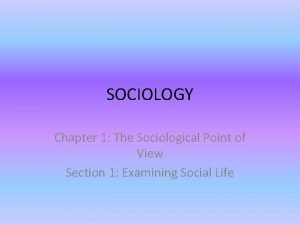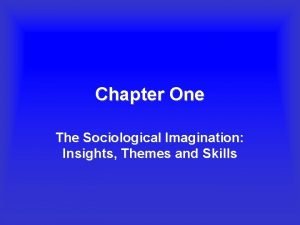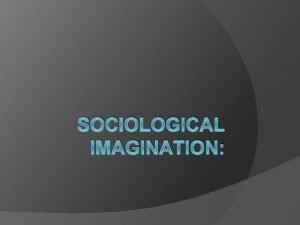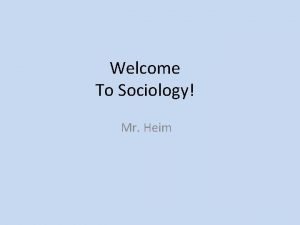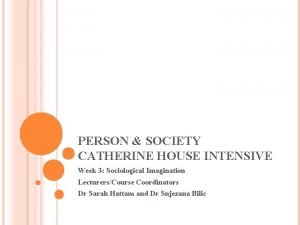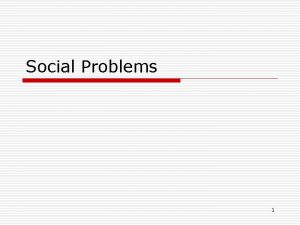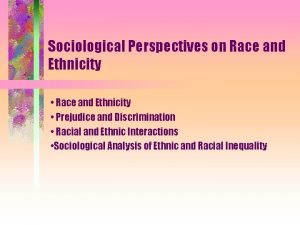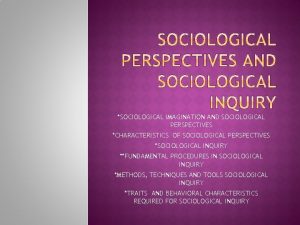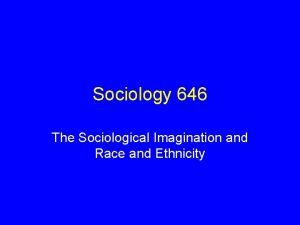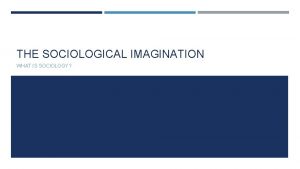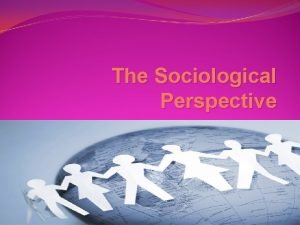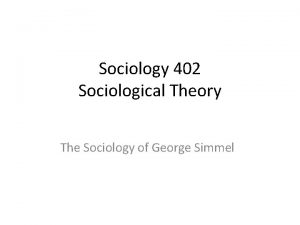Sociology 134 The Sociological Imagination and Race and











- Slides: 11

Sociology 134 The Sociological Imagination and Race and Ethnicity

C. Wright Mills and the Sociological Imagination • Understanding our own lives involves understanding the history and current status of the society in which we live. • Perspectives (Conflict/Consensus) • Tools (ethnography, statistics) • Challenge conventional wisdom: the common understanding of a situation.

Example: Racial Profiling • Blacks, Hispanics – Orlando, 1992: Road with 5% black drivers and 70% of stopped drivers black -- Maryland, 1998: Road with 20% black drivers and 70% of stopped drivers black -- Illinois, 1999: 8% of state’s residents were Hispanic, while 25% of individuals stopped by drug interdiction units were Hispanic

What are some possible explanations of these statistics? • Negative – Prejudice and discrimination – Poor training – Bad policing • Positive – Higher rates of illegal activities

Racial Profiling of Muslims and Arabs • Targeting 5, 000 young men from Muslim countries for questioning after 9/11, 2001. • FBI: talk to everyone who might have information • Muslim leaders: racial profiling • What do you think: was this good or bad?

What sociological questions can we pose? (C. Wright Mills) • How are racial and ethnic relations structured? • How do racial and ethnic relations compare to the past and other countries? • What does the past and current state of racial and ethnic relations suggest about our “human nature”?

Applied to racial profiling • What is the structure, extent, nature, and form of racial profiling? • How does racial and ethnic profiling here compare to other countries and the past? • What does racial profiling reveal about our human nature? – Racial divide – We have not resolved all of our issues

Some classic examples 1. An American Dilemma by Gunnar Myrdal (1944) 2. The Declining Significance of Race by William Julius Wilson (1978) 3. Legacies: The Story of the Immigrant Second Generation by Alejandro Portes and Ruben Rumbaut (2001)

Code of the Street • Ethnographic • Explores the structure and culture of life in the inner city

The Ecological Indian • Were Indians the original environmentalists?

Latinos: A Biography of the People • Allowing people to tell their own histories and stories • Looking at different Latino groups separately
 Sociological imagination vs sociological perspective
Sociological imagination vs sociological perspective Sociological imagination examples race
Sociological imagination examples race By adopting a sociological imagination
By adopting a sociological imagination The sociological imagination chapter 1 summary
The sociological imagination chapter 1 summary Sociological imagination abortion
Sociological imagination abortion Youtube sociological imagination
Youtube sociological imagination Sociological.imagination
Sociological.imagination Social logical imagination
Social logical imagination Define social problem
Define social problem Sociological perspective on race in philippines
Sociological perspective on race in philippines Impulse and reaction turbine
Impulse and reaction turbine Types of spillway
Types of spillway


